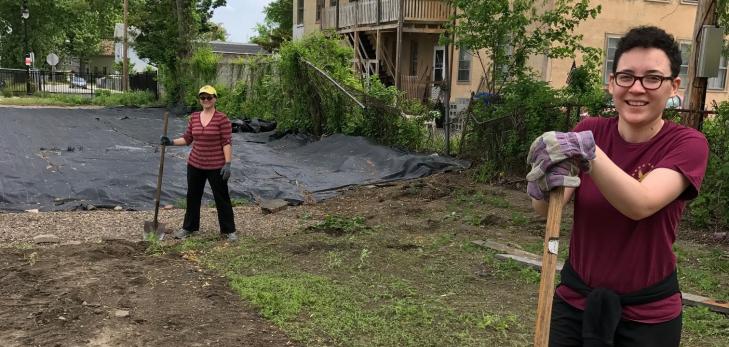Recently, my team and I traveled out to Walnut Street Farm in Springfield, a city in central Massachusetts to work as volunteers for Anne Richmond and Ibrahim Ali, co-directors of Gardening the Community (GTC), a food justice organization engaged in youth development, urban agriculture and sustainable living to build healthier and more equitable communities.
Most days, my job at TSNE involves working with our fiscally sponsored projects using computers and calculators. Today though, my work in service to Gardening the Community involved using spades and wheelbarrows weeding a three-quarter acre plot at their farm located in one of the densest parts of Springfield. The farm is the first plot of land purchased by Gardening the Community just three years ago, a milestone for this organization that had previously farmed only on rented lots. We began our partnership together in May of 2012, and in the past five years, Gardening the Community has grown in every way, adding land, staff, and programs; and increasing their visibility in the city of Springfield. TSNE has grown a lot in that time as well, and while my accounting work is very important to groups like Gardening the Community to keep their organization running smoothly, it is also personally rewarding to contribute to this amazing group in a hands-on way.
The land at Walnut Street Farm has gone through a stunning transformation. They removed 400 tons of debris from the lot; and built a huge beautiful greenhouse, with a deep foundation for extra natural geothermal insulation and superb capacity for rainwater collection and storage. Now it is divided into four generously sized beds, each about 30 feet by 40 feet.
On that warm day in May, our team of volunteers worked on preparing the bed in the back corner furthest from the street; nothing had been planted there as the soil needed years of restoration. In groups of two, we began by rolling back large pieces of black landscape fabric that had been stapled down last season. Then, I settled into an area about the size of my living room to weed out invasive plants. This was full-contact weeding. Not the weeding I am used to in the teeny flowerbeds in my postage stamp lawn. I was standing, not kneeling; and using a long-handled spade instead of a cute little garden tool. I chunked the blade into the earth, and then stood on the short edge to leverage down and under the root ball. I leaned down and grasped the stalks close to the earth, pulled the whole sucker up, and shook the dirt loose. Then, I repeated with the next weed, and the next, and the next until lunch.
Later in the afternoon, I commandeered a wheelbarrow while my co-workers attacked overgrown hedges from along the fence in the back corner of the lot. They had long-handled clippers and used lots and lots of muscle. I gathered up the cut branches until I had an almost dangerously precarious load, and then tottered off to the compost area. It’s just a slab right now, but I understand there are plans to build bins in order to recycle much of the plant material back into the earth.
As I worked I thought about all the variables for which Ibrahim and Anne must prepare. They are farmers, and are always at the mercy of the weather. They are also a nonprofit and, of course, must weather lots of other variables, like funding cycles, grants, donations, and state funds; plus volunteers, equipment purchases, contracts, vehicles, expenses and all the other business of running their business. This is where fiscal sponsorship steps in most regularly, helping them manage the day to day so they could focus on revitalizing the soil, building the greenhouse, nurturing the produce, and ultimately engaging the community. I so admire Anne and Ibrahim, what they have built and all of the work they do.
By the end of the day I was a little tired, and a little sweaty, and maybe tasted a bit of dirt in the back of my mouth. Nevertheless, I am thrilled to be a partner to this this amazing organization, and so grateful for the opportunity to work with them not just as an accountant, but also as an honorary gardener for a day.
